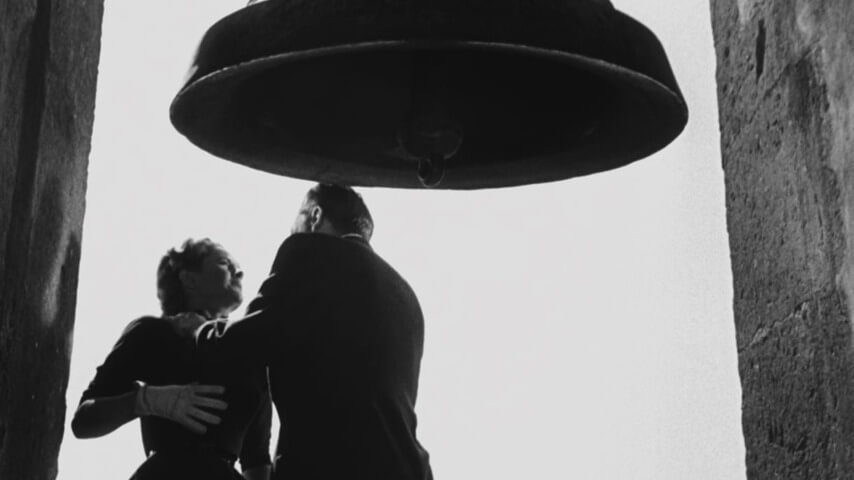In Cult Of Criterion, The A.V. Club highlights a new release from The Criterion Collection each month, examining the films entering an increasingly accessible film canon.
Before he went back to his native Spain with the Cannes-winning Viridiana in 1961, pioneering surrealist Luis Buñuel was exiled in Mexico, embedded in its flourishing film industry. Caught between the riveting oddities of his early collaborations with Salvador Dalí and the more straightforward provocations of his late-career art films (Viridiana, for example, was deemed “blasphemous” by the Vatican), Buñuel’s midlife movies suffused mass-appeal Mexican melodramas with his own simmering preoccupations. This subversion fully boils over in 1953’s Él, a hateful, horny, feminist anti-romance—and a favorite of filmmaker Guillermo del Toro—that spits in the face of “love at first sight.”
Relationships, specifically privileged bourgeois men in relationships, are the main target of Él‘s ire, but so too are masculine institutions like the Catholic Church. This is where Francisco (Arturo de Córdova) first encounters Gloria (Delia Garcés)—well, where he first encounters her feet. Not needing to do much to pervert a foot-washing ceremony where a priest lovingly kisses a series of children’s feet, Buñuel fixates his camera (and the gaze of Francisco) on a row of feet, finally lingering on Gloria’s smooth high heels. When their eyes finally meet at the end of a kinky Tarantino ascent up her body, it’s a look that twists together fear and passion, which foreshadows all that is to come in the film.
Criterion’s crisp new 4K restoration makes every tic and shadow flickering across the leads’ facial expressions as prominent as de Córdova’s bugging eyes when his controlling psyche fully shatters. As the initially urbane Francisco, de Córdova’s broad-shouldered bearing and fragile ego beautifully contradict each other as his true character becomes more and more exposed to those around him. In the reality played by Garcés, her character easily wooed away from her ex Raul (Luis Beristáin) and into marriage with Francisco, she teeters between the heady fairy tale it seems she might be living and the shrinking cell walls of emotional abuse closing in around her.
Though Él adapts Mercedes Pinto’s autobiographical novel from her pure perspective as a mistreated wife and towards a shifting point-of-view between that of its increasingly abusive husband and his increasingly desperate victim, Buñuel’s film unearths a psychological reality within its plot’s antagonist as shocking and resonant as the plight weathered by its survivor. The marriage Buñuel and co-writer Luis Alcoriza savvily depict, in all its twisty (and eventually externalized) pathology, is one still clearly comprehensible through modern ideas. The manipulative seesaw of love bombing and devaluation, of jealousy and entitlement, are wrapped up in society-wide 20th-century machismo—and yet, its bullheadedly doubting authority figures wouldn’t be out of place in an indie romance-gone-wrong from this year.
The dialed-in performances from the two leads, perfectly fluctuating along the highs and lows of their volatile relationship, define this intermingled sense of love and danger. The physical heft of de Córdova alternatively looms and wilts depending on his fury or depression; Garcés’ moony infatuation curdles as she’s not only abused, but chastised by everyone from her pastor to her own mother. Bolstering these gripping turns are revealing sequences that speak to the tenor of the relationship. These can be realistic and petty, like Francisco demanding Gloria take vacation photos of him while he takes none of her (a detail all the more deliciously scathing in the social media era), or absurd and haunting, like a terrifyingly percussive moment where Francisco throws a fit on his mansion’s uncanny staircase.
It’s in the indignities of domestic conflict where Buñuel unleashes his surrealism. In the heat of a fight, when the person you love shows an ugly side of themselves, it can feel as if reality’s rug has been yanked from beneath you. With sinister sound design and some truly upsetting jump cuts in its climactic finale (cuts that would be echoed to similarly horrific effect in films like Ingmar Bergman’s nightmarish Hour Of The Wolf), Buñuel weaponizes this unmooring from rationality with an assault on the senses. He builds to this breakdown of mind and form alike with impressive restraint in an otherwise buttoned-up marital drama—a representative example of how he was able to maintain his personal interests within the systemic trappings of Mexican cinema’s Golden Age.
As del Toro points out in an interview included on the disc, there’s something almost Hitchcockian to the mental unraveling of Él and the visual precision with which it unfolds. But even more than its relationship to that clockwork thrillmaker, Él‘s most impressive relationship is the one it balances between its industry’s hallmarks (the broad relationship struggle familiar to the Rumberas, the moral crises of noir, the social change sprinting through the country) and the boundary-pushing proclivities of its filmmaker (its Church-bloodying set pieces, unrepentant fetishism, jagged shards of style-driven id). At this seemingly incompatible intersection, Luis Buñuel carved out a surprisingly respectable and middlebrow career before he went back to pissing off Popes later in his life. Raw psychology shipped in a polished package, Él shows what an auteur can do even when they’re just working a job.

 Keep scrolling for more great stories.
Keep scrolling for more great stories.
